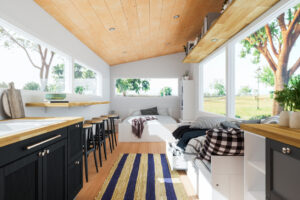As a real estate investor in Winston-Salem, maximizing your rental income while increasing property value is always a priority. One creative way to achieve this is by adding a tiny home to your existing single-family rental property. With rising housing costs and a growing demand for affordable rental options, tiny homes are becoming an attractive investment trend.
But before you move forward, it’s crucial to understand both the opportunities and challenges that come with incorporating a tiny home into your Winston-Salem rental strategy.

What Is a Tiny Home?
A tiny home is typically defined as a detached dwelling under 400 square feet. Some are built on a permanent foundation, while others are mobile, mounted on wheels like RVs. These compact structures cater to renters looking for affordable, minimalist, and eco-friendly housing.
Benefits of Adding a Tiny Home to a Rental Property
For Winston-Salem property investors, a tiny home may seem like a smart way to:
-
Increase rental income without buying a second property
-
Appeal to renters seeking a minimalist or eco-conscious lifestyle
-
Boost property value and attract more tenant interest
-
Offer flexible multi-family living or guest housing on one lot
In high-demand rental markets, having an extra, smaller unit can help you reach new demographics—students, single professionals, or retirees—all while diversifying your income stream.
What to Consider Before Adding a Tiny Home
Despite the appeal, adding a tiny house to your property isn’t always simple—or legal.
1. Cost of Building a Tiny Home
-
Construction costs range from $30,000 to $180,000+.
-
Financing can be difficult—many lenders won’t offer traditional mortgages for tiny homes.
-
Higher interest rates and out-of-pocket costs are common.
2. Zoning and Building Regulations
-
Winston-Salem zoning laws may restrict additional dwellings on single-family lots.
-
Local codes may require:
-
A permanent foundation
-
Minimum square footage
-
Utility hookups and inspections
-
-
Permits, site planning, and utility extensions add to overall costs.
Pro tip: Always check with Winston-Salem’s city planning or building department before starting construction.
3. Impact on Current Tenants
If your property is already occupied, adding a second unit could:
-
Increase foot and vehicle traffic
-
Affect tenant satisfaction and lease renewals
-
Lead to noise or privacy concerns
Before moving forward, consider how the change will affect your existing tenant relationships.
4. Tiny Homes May Not Appreciate
Unlike traditional real estate, tiny homes on wheels typically depreciate like vehicles. Even tiny homes on foundations may not appreciate at the same rate as full-sized homes or traditional additions.
Is a Tiny Home Right for Your Winston-Salem Investment Property?
Adding a tiny home rental unit to your property can be a creative way to boost your income and property value. But due diligence is key. From zoning laws and construction costs to tenant relations and resale value, every factor should be carefully weighed before moving forward.
Need Help Managing Your Rental Investment?
Whether you’re exploring tiny home investments or looking for help managing your current rental portfolio, Real Property Management of the Triad is here to help. Feel free to contact us online or by phone at 336-355-6677 or 336-777-7444. We’ll be glad to answer any of your questions.
We are pledged to the letter and spirit of U.S. policy for the achievement of equal housing opportunity throughout the Nation. See Equal Housing Opportunity Statement for more information.




